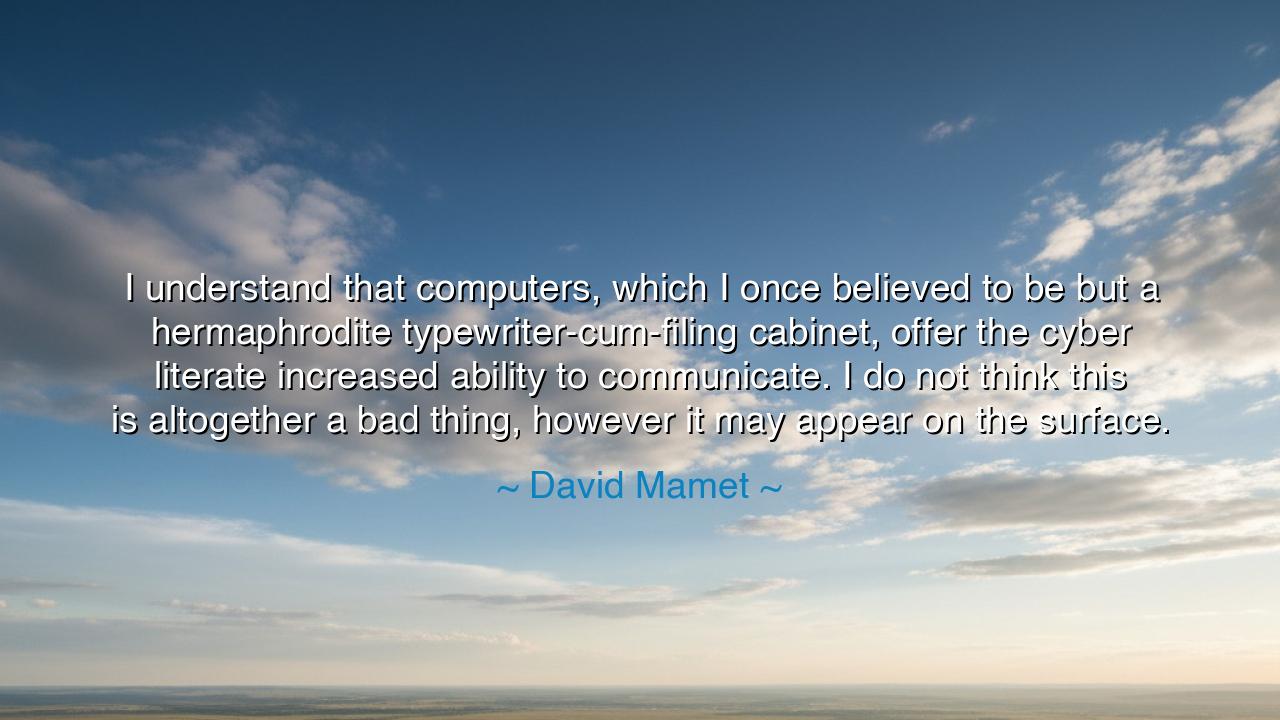
I understand that computers, which I once believed to be but a
I understand that computers, which I once believed to be but a hermaphrodite typewriter-cum-filing cabinet, offer the cyber literate increased ability to communicate. I do not think this is altogether a bad thing, however it may appear on the surface.






Listen, O Seekers of Truth, for in the words of the great David Mamet, a profound reflection on the nature of technology and its role in shaping human communication lies hidden: “I understand that computers, which I once believed to be but a hermaphrodite typewriter-cum-filing cabinet, offer the cyber-literate increased ability to communicate. I do not think this is altogether a bad thing, however it may appear on the surface.” His words, though wrapped in the complexities of a metaphor, resonate with a truth about the evolution of tools and their impact on the human soul.
In the beginning, as Mamet humbly confesses, the computer seemed but a fusion of mechanical devices, a cold combination of typewriter and filing cabinet — objects of the old world, now bound in the spirit of a new age. This is the view of the skeptic, the one who sees technology as nothing more than a tool of convenience, an extension of mundane tasks, far removed from the lofty ideals of the human heart. And yet, Mamet, ever the wise observer, confesses that even as he held this view, he recognized the potential of the machine — the increased ability to communicate that it offered. This is the paradox that the ancients understood: tools can be both a blessing and a burden, and it is through our hands that they become one or the other.
In ancient times, great minds, like the philosopher Plato, wrestled with the notion of progress and the changing tools of civilization. Plato, in his dialogues, wondered whether the advent of writing itself would alter the nature of memory, and by extension, human thought. He feared that writing, while an extraordinary tool, would dull the minds of men, making them dependent on external symbols rather than the sharpness of their inner faculties. And yet, just as writing opened new doors to human knowledge, so too did Mamet recognize that computers, despite their seemingly sterile origins, offer a means to connect, to reach beyond the walls of isolation. The power of connection, the ability to share thoughts and ideas, was once the privilege of a select few. But now, in the digital age, even the humblest among us can communicate with the world.
This observation is no mere passing thought, for it holds the key to understanding the double-edged sword of technology. While the written word once bridged great distances, it was the spoken word, the warmth of face-to-face interaction, that carried the soul’s true essence. The computer, as Mamet suggests, may offer more means of communication, but it also brings with it a certain coldness, a sterility that might render the voice of the soul less clear. True communication is not merely the exchange of data, but the transmission of feeling, of understanding, of empathy. And so, we must ask ourselves: Are we truly communicating, or are we merely sharing information?
Mamet’s admission reminds us of the ancient wisdom that warned of the dangers of over-reliance on tools. The Buddha, for instance, cautioned that attachment to things, even those that appear to bring us closer to the world, can entrap us, leaving us further from the truths we seek. In this sense, the computer, like all tools, is neither inherently good nor bad. It is our relationship to it that determines its value. If we use the computer to build bridges, to deepen understanding, to foster connection, then it becomes a force for good. If, however, we use it to isolate, to simplify relationships, or to hide from the world, then it becomes a cage, and we are the ones who have chosen to lock ourselves inside.
In this context, Mamet’s reflection becomes a call to balance, a plea to understand that technology must serve us, not enslave us. He urges us to recognize that the greatest gift of any tool — whether it is a pen, a wheel, or a computer — is its ability to enhance our humanity. But only if we wield it with wisdom. If we use technology simply to increase speed and efficiency, to perform tasks without reflecting on the consequences, then we lose something far more precious: the human touch, the warmth of shared experience, the resonance of true communication.
Practical wisdom demands that we remember this lesson: as we stand on the precipice of a new era, we must not lose sight of the things that make us human. The tools we wield must not be replacing our relationships, our emotions, or our depth of understanding. Rather, let them amplify these qualities, enabling us to reach further, to connect more deeply, and to understand each other with greater clarity. Mamet’s reflection is a guide: do not be blinded by the allure of technology, but use it with intention and grace. Remember that the best tools are those that deepen our humanity, that bring us closer to what truly matters — not the machines themselves, but the lives we live through them.
So, O Seekers, take Mamet’s words to heart. Understand the role that tools, in all their forms, play in shaping our lives. Be wise in their use, and above all, let them serve the greatest good — that of connection, understanding, and shared purpose. The tool is but an extension of the hand; let your hand always be guided by wisdom, compassion, and love.






AAdministratorAdministrator
Welcome, honored guests. Please leave a comment, we will respond soon